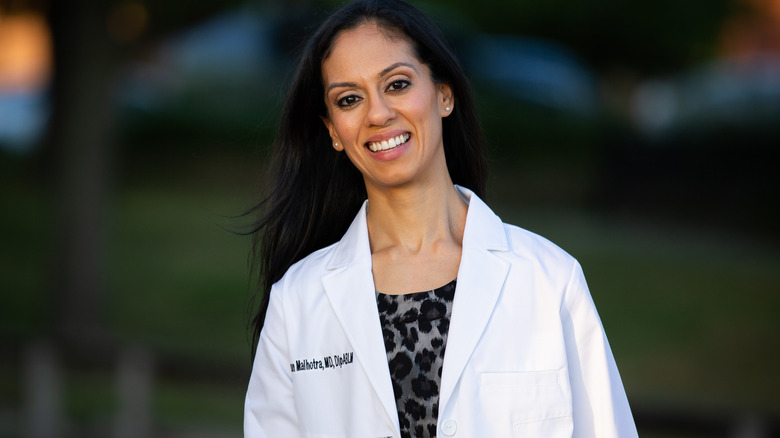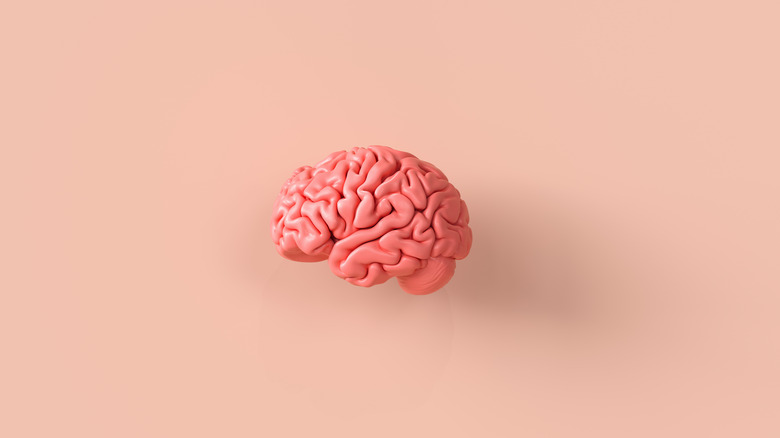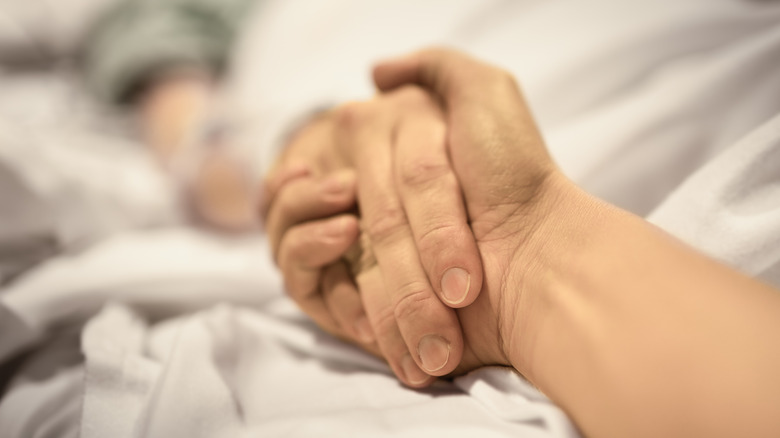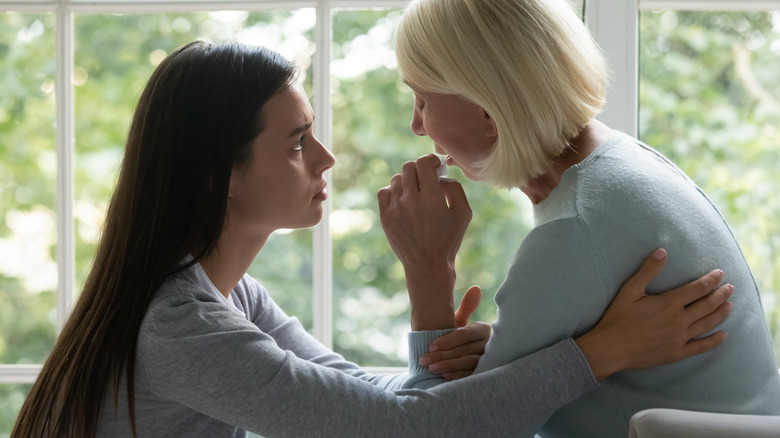What People See And Hear Before They Die - Exclusive
Almost everyone could agree that one of the most mysterious aspects of life is death. Despite the fact that death will happen to everyone, no one truly knows what happens after we die, and death is something that's largely out of our control. Understandably, this realization can provoke anxiety and fears surrounding death in many people, with approximately 19% of Americans reporting their fear of death in a 2016 Chapman University survey. Even greater, 38.1% of respondents reported having a fear of their loved ones dying. Gaining an understanding of what happens during our final breaths may alleviate the severity of death anxiety for some individuals and can help medical professionals better support grieving loved ones who are experiencing a loss.
When someone is terminally ill, one of the treatment options available to them is palliative care. In an exclusive interview, Health Digest spoke with leading palliative care specialist Dr. Simran Malhotra to better understand what sensory experiences someone can have before their death. She is a triple board-certified physician and was named a "Top Doc" for palliative medicine by Baltimore Magazine in 2019 and 2020.
"After several similar patient and personal family experiences of these final moments, I have embraced the feeling of awe and wonder at the beauty and mystery of life that they all point to," she tells us. "As one approaches death, it seems that the veil between this world and the next becomes thinner, and we are given a glimpse of the other side."
What happens in the brain when someone is dying?
As the organs of the body begin to shut down during one's final moments, a person's cognitive functioning will be affected. Individuals who are on the brink of death are primarily unconscious with brief conscious moments, Dr. Malhotra tells us.
"Exactly what's happening in our brains has often remained a mystery," she emphasizes. Scientists have begun studying what happens to the brain before death in hopes of finding answers to the mystery surrounding the process. "Earlier this year, according to neuroscientists, the brain of a dying 87-year man exhibited rhythmic brain wave patterns that were similar to those seen during dreaming, memory recall, and meditation," she shared. "This study found evidence that the brain may stay active and coordinated after a person has passed away, while orchestrating vivid memories and flashbacks from the person's life." She believes this could potentially explain reported near-death experiences of feelings of euphoria and peace, as well as vivid memories.
"What's happening in our brains during our last moments?" she questions. "Although we may never know for sure, this study brings us closer to understanding the [end of life] experience." The insights from this study can be particularly helpful for professionals delivering the news of a loved one's death to grieving families, says Dr. Malhotra. Having the knowledge that a loved one might have relived fond memories from their life before their death may provide greater solace to their family and friends during an especially painful time.
What is the last sense to go when someone dies?
When a loved one is dying, especially if they are unresponsive, many people wonder if they can hear and understand them. Dr. Malhotra reassures us that those in the medical profession believe that dying individuals can still hear and feel the presence of those around them, even if they are unable to respond. "A fascinating study was published in 2020 where neuroscientists found that some people can still hear while in an unresponsive state, up to hours before they die," she told us.
For this reason, she suggests that families and friends only speak about things that they want their loved ones to know and to leave the room if they need to speak about something they wouldn't want them to hear. "This is often why I hold family meetings outside the room of a patient who is no longer able to interact," she explains.
Knowing that a loved one can still hear you may also provide a source of comfort when preparing for their death, and can be an intimate time when an individual can share their feelings and thoughts with the person they love. "I also encourage them to hold their hand, tell them they are there and the things that matter most (I'm sorry, please forgive me, I love you, and thank you)," Dr. Malhotra emphasizes.
Do people have auditory and visual experiences before they die?
While the thought of dying can be terrifying for even the bravest of us, Dr. Malhotra shares how many of her patients experience a special comfort in the form of end-of-life dreams and visions, also referred to as ELDVs.
"Most of my patients have had similar experiences where they would have comforting visits and conversations with deceased loved ones (family, friends, pets) and for some, religious figures," she describes. "Other unique experiences that I have heard from patients were sensing the presence of a loved one in the room, calling out deceased loved one's names, being told someone is calling them, seeing bright lights, or just 'being at peace.'" After noticing similar patterns in her patients, Dr. Malhotra began to recognize these visions as a sign of what was coming.
She notes that some perceive ELDVs to be spiritual experiences, but that healthcare professionals sometimes feel unequipped to handle them when they happen to a patient. Because of this, they may misdiagnose these visions as delirium. "While ELDVs are hallucinations in the strictest sense of the word, they are not thought to be secondary to delirium," she highlights.
"It reminds me constantly that not everything in this magnificent life needs to have a reason or medical explanation," she tells us. "Each time I experience this gift from a patient or loved one, it reinforces that belief in me that there are no goodbyes, only 'see you laters.'"
How can these visions affect the loved ones of someone who is dying?
Losing a loved one to death is an especially distressing experience, bringing about intense and confusing emotions of grief. Dr. Malhotra shares how many of her patients feel comforted when their dying loved one experiences visions because they feel that they're reuniting with others they love.
"Since these visions are not easy to explain using science and reason, I believe it is important to keep an open mind and heart when caring for patients and families during this time," she states. "In these instances, I often validate their feelings and share this is a common end-of-life experience for many."
Some may feel uncomfortable or frightened by their loved one's visions, and this is also a valid response. Individuals who are disturbed by the visions can seek support through pastoral care, support groups, books, and other coping outlets. "In my own experience, I have counseled family members that if their loved one is comfortable and not bothered by the visions, to simply accept their experience and gently reassure them," says Dr. Malhotra. "If the patient is agitated or distressed, however, medications can be used to help provide comfort."
Because everyone's experience is different, she stresses the importance of individualized care and awareness of how to support patients and loved ones during the dying process.
If you would like to learn more about Dr. Simran Malhotra, you can visit her website and follow her on Instagram.





